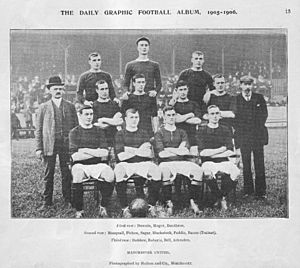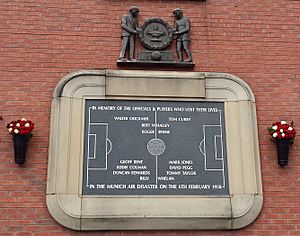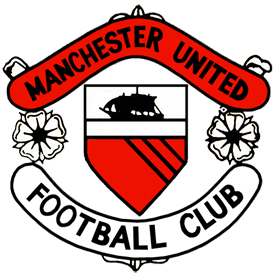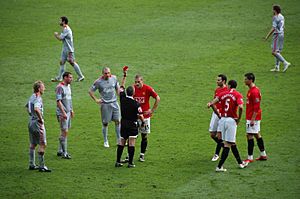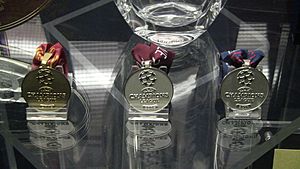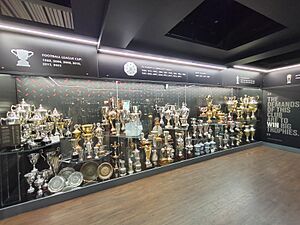Manchester United F.C. facts for kids
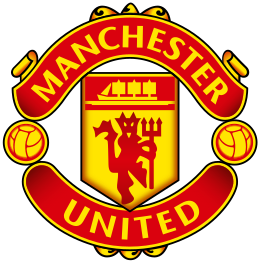 |
||||
| Full name | Manchester United Football Club | |||
|---|---|---|---|---|
| Nickname(s) |
|
|||
| Short name | Man United Man Utd MUFC |
|||
| Founded |
|
|||
| Ground | Old Trafford | |||
| Capacity | 74,310 | |||
| Owner | Manchester United plc (71.06%) Ineos (28.94%) |
|||
| Co-chairmen | ||||
| Head coach | Michael Carrick | |||
| League | Premier League | |||
| 2018–19 | Premier League, 6th of 20 | |||
|
||||
Manchester United Football Club, often called Man United or just United, is a famous professional football team. They are based in Old Trafford, England. The team plays in the Premier League, which is the top football league in England. Their nickname is the Red Devils.
The club started in 1878 as Newton Heath LYR Football Club. In 1902, they changed their name to Manchester United. They moved to their current home stadium, Old Trafford, in 1910. Manchester United has won many trophies. They have won a record twenty English league titles. They also have thirteen FA Cups and six League Cups. In international competitions, they have won the European Cup/UEFA Champions League three times. They also won the UEFA Europa League, UEFA Cup Winners' Cup, UEFA Super Cup, Intercontinental Cup, and FIFA Club World Cup once each.
A legendary manager named Matt Busby led the team from 1945. He built a young team known as the Busby Babes. They won league titles in the 1950s. Sadly, eight players died in a tragic plane crash in 1958. Busby bravely rebuilt the team with stars like George Best, Denis Law, and Bobby Charlton. This famous trio was called the United Trinity. They won the European Cup in 1968, becoming the first English club to do so.
After Busby, another great manager, Alex Ferguson, took over in 1986. He became the club's most successful manager. He won 38 trophies, including 13 league titles and two Champions League titles. In the 1998–99 season, his team achieved a historic "Treble." This meant winning the Premier League, FA Cup, and Champions League all in one season. Later, in 2016–17, they won the UEFA Europa League. This made them one of only five clubs to win all three main European club competitions.
Manchester United is one of the most popular football clubs worldwide. They have big rivalries with Liverpool, Manchester City, Leeds United, and Arsenal. The club is also very valuable. In 2024, it was the world's second-most-valuable football club. It was worth about £6.55 billion. The club is owned by the Glazer family and Ineos (led by Sir Jim Ratcliffe).
Contents
- The Story of Manchester United
- Club Badge and Team Colours
- Home Grounds: Where United Plays
- Fan Support and Rivalries
- Manchester United as a Global Brand
- Club Ownership and Finances
- Current Players
- Coaching Staff and Managers
- Club Management
- Club Honours: Trophies Won
- Manchester United Women's Team
- See also
The Story of Manchester United
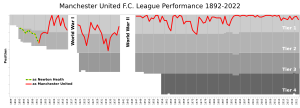
Early Years: Starting as Newton Heath (1878–1945)
Manchester United began in 1878. It was called Newton Heath LYR Football Club. Railway workers from Newton Heath formed the team. They first played against other railway teams. On November 20, 1880, they played their first recorded match. They wore green and gold, the railway company's colours. They lost 6–0 to Bolton Wanderers' reserve team.
By 1888, the club helped start a league called The Combination. After that league ended, Newton Heath joined the Football Alliance. This league later joined The Football League. So, in the 1892–93 season, the club played in the First Division. By then, they were no longer part of the railway company. They dropped "LYR" from their name. After two seasons, they moved down to the Second Division.
In January 1902, the club faced financial trouble. Captain Harry Stafford found four local businessmen to help. One was John Henry Davies, who became club president. They each invested money to save the club. On April 24, 1902, the club officially became Manchester United.
Under manager Ernest Mangnall, the team did well. They finished second in the Second Division in 1906. This earned them promotion to the First Division. In 1908, they won their first league title. The next season, they won the first ever Charity Shield. They also won their first FA Cup title. Mangnall helped the team move to Old Trafford in 1910. Manchester United won the First Division again in 1911. Mangnall left the club to join Manchester City after that season.
After World War I, the club moved down to the Second Division in 1922. They returned to the First Division in 1925. But they were relegated again in 1931. In 1934, they reached their lowest point, 20th in the Second Division. They almost dropped to the Third Division. James W. Gibson invested £2,000 in 1931. This saved the club from going bankrupt. In the 1938–39 season, the last before World War II, the club finished 14th in the First Division.
The Busby Era: Building a Legacy (1945–1969)
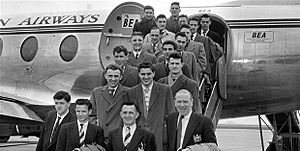
In October 1945, Matt Busby became the manager. He had a lot of control over the team. Busby led the team to second place in the league three times. They also won the FA Cup in 1948. In 1952, the club won the First Division. This was their first league title in 41 years.
They won league titles again in 1956 and 1957. The team was very young, with an average age of 22. The media nicknamed them "the Busby Babes." This showed Busby's trust in young players. In 1957, Manchester United became the first English team to play in the European Cup. They had a huge 10–0 win against Anderlecht. This is still the club's biggest victory.
The next season, a terrible event happened. On February 6, 1958, a plane carrying the team crashed in Munich, Germany. This was the Munich air disaster. 23 people lost their lives, including eight players. Many others were injured.
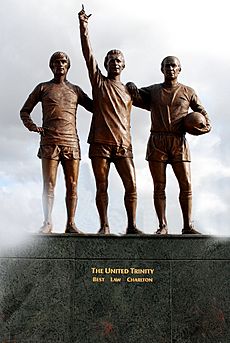
Assistant manager Jimmy Murphy took over while Busby recovered. The team reached the FA Cup final but lost. UEFA invited the club to play in the European Cup again. However, The Football League said they could not, as they hadn't qualified. Busby rebuilt the team in the 1960s. He signed players like Denis Law and Paddy Crerand. These players joined new young talents like George Best. They won the FA Cup in 1963.
The team then won the league title in 1965 and 1967. In 1968, Manchester United made history. They became the first English club to win the European Cup. They beat Benfica 4–1 in the final. That team had three European Footballers of the Year: Bobby Charlton, Denis Law, and George Best. Busby retired as manager in 1969.
Challenges and Trophies (1969–1986)
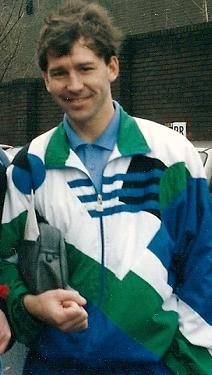
After Busby, Wilf McGuinness became manager. But he was replaced by Busby temporarily in 1970. In 1971, Frank O'Farrell took over. He was replaced by Tommy Docherty in 1972. Docherty saved the team from relegation that season. But they were relegated in 1974. By then, star players Best, Law, and Charlton had left.
The team quickly won promotion back to the top league. They reached the FA Cup final in 1976 but lost. They reached the final again in 1977, beating Liverpool 2–1. Docherty was dismissed shortly after.
Dave Sexton became manager in 1977. Despite signing big players, the team did not win any trophies. They finished second in 1979–80. They also lost the 1979 FA Cup final. Sexton was dismissed in 1981. Ron Atkinson replaced him. Atkinson signed Bryan Robson for a record fee. Under Atkinson, Manchester United won the FA Cup in 1983 and 1985. They also won the Charity Shield against Liverpool. In 1985–86, the club started very strong. But they finished fourth in the league. Atkinson was dismissed the next season.
The Ferguson Era: Unprecedented Success (1986–2013)
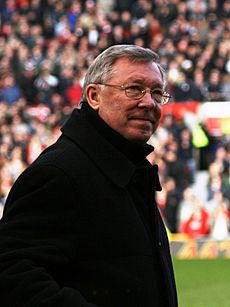
Alex Ferguson became manager on November 6, 1986. He led the club to an 11th-place finish. After a second-place finish in 1987–88, they were 11th again the next season. Ferguson's job was saved by winning the 1990 FA Cup final. The next season, Manchester United won their first UEFA Cup Winners' Cup. They also won the UEFA Super Cup in 1991.
The club won the League Cup for the first time in 1992. In 1993, they won their first league title since 1967. This was in the new Premier League. A year later, they won a second title in a row. They also won the FA Cup. This was the club's first "Double." United became the first English club to win the Double twice in 1995–96. They won the league title again in 1996–97.
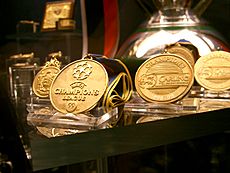
The 1998–99 season was historic. Manchester United won the Premier League, FA Cup, and UEFA Champions League. This was called "The Treble." In the 1999 UEFA Champions League final, they were losing 1–0. But Teddy Sheringham and Ole Gunnar Solskjær scored late goals. They won dramatically against Bayern Munich. Ferguson was made a knight for his achievements.
In November 1999, the club won the Intercontinental Cup. They beat Palmeiras 1–0 in Tokyo. Manchester United won the league again in 1999–2000 and 2000–01. They were the fourth club to win the English title three times in a row. They won the title again in 2002–03.
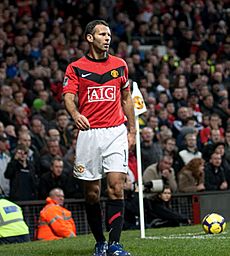
They won the 2003–04 FA Cup in 2004. They beat Millwall 3–0 in the final. In 2005–06, they won the 2006 Football League Cup final. The club won the Premier League title in 2006–07. They then won the "European Double" in 2007–08. They beat Chelsea in the 2008 UEFA Champions League final on penalties. This was their 17th English league title. Ryan Giggs played his record 759th game for the club in that final.
In December 2008, United won the 2008 FIFA Club World Cup. They beat LDU Quito 1–0 in the final. They then won the 2008–09 Football League Cup and their third straight Premier League title. In 2010, Manchester United won the League Cup again. They achieved a record 19th league title in 2010–11. This was extended to 20 league titles in 2012–13.
Recent Years: After Ferguson (2013–Present)
On May 8, 2013, Ferguson announced his retirement. He retired as the most successful manager in football history. Everton manager David Moyes replaced him. However, Moyes was sacked after a poor season. The club failed to win the Premier League. They also missed out on European competitions. Ryan Giggs became interim player-manager.
On May 19, 2014, Louis van Gaal became manager. Giggs was his assistant. Under Van Gaal, United won a 12th FA Cup. But he was sacked two days after the final. José Mourinho was appointed manager in May 2016. In his first season, Mourinho won the FA Community Shield, EFL Cup, and UEFA Europa League. Wayne Rooney became the club's all-time top scorer in January 2017.
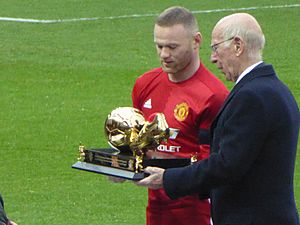
The next season, United finished second in the league. But they lost the 2018 FA Cup final. Mourinho was sacked in December 2018. Former United striker Ole Gunnar Solskjær became caretaker manager. He was made permanent manager in March 2019.
In April 2021, Manchester United joined the proposed European Super League. This caused a lot of anger among fans. The club withdrew from the league two days later. Protests against the club's owners led to a match postponement. On the pitch, United had a 9–0 win over Southampton. But they lost the Europa League final. Solskjær left his role in November 2021. Michael Carrick took charge temporarily. Then Ralf Rangnick became interim manager.
On April 21, 2022, Erik ten Hag was appointed manager. Under Ten Hag, Manchester United won the 2022–23 EFL Cup. They beat Newcastle United in the final. This ended their longest period without a trophy. In March 2023, the club suffered a heavy 7–0 defeat to Liverpool. In the 2023–24 season, they finished eighth in the Premier League. This was their lowest league finish since 1989–90. However, they won their 13th FA Cup. They beat rivals Manchester City 2–1 in the final.
On October 28, 2024, Erik ten Hag was sacked. The club was 14th in the Premier League. On November 1, 2024, Ruben Amorim was appointed head coach. He started on November 11, 2024. The club finished the 2024–25 season 15th in the Premier League. They also lost the UEFA Europa League final to Tottenham Hotspur. On January 5, 2026, Amorim was sacked. Under-18s manager Darren Fletcher took over temporarily. Currently, Michael Carrick is the interim head coach.
Club Badge and Team Colours
The Manchester United Crest: A Symbol of History
The club's badge comes from the Manchester City Council coat of arms. The ship with full sails is still on the current badge. The devil comes from the club's nickname, "The Red Devils." This nickname was inspired by the Salford Rugby Club. The devil was added to club programmes in the 1960s. It became part of the club badge in 1970. In 2023, the Red Devil alone was used on the third kit. The main crest stays on the home and away kits.
Team Colours: Red, White, and Black
Newton Heath's first uniform in 1879 was white with blue cords. A photo from 1892 shows players in red-and-white shirts. They also wore navy blue shorts. Between 1894 and 1896, they wore green and gold shirts. These were changed to white shirts and navy blue shorts in 1896.
After the name change in 1902, the club colours became red shirts, white shorts, and black socks. This is now the standard home kit. Few changes were made until 1922. The club used white shirts with a deep red "V" around the neck. These were part of the home kit until 1927. For a short time in 1934, a cherry and white striped shirt was the home kit. But the red shirt returned the next season.
The black socks changed to white from 1959 to 1965. Then they were red until 1971, when they went back to black. Sometimes, black shorts and white socks are worn with the home strip. This happens if there is a colour clash with the opponent's kit. For 2018–19, black shorts and red socks became the main home kit choice. Since 1997–98, white socks have been preferred for European games. This helps players see each other better. The current home kit is a red shirt with Adidas' three stripes. It has white shorts and black socks.
The Manchester United away kit is often a white shirt, black shorts, and white socks. But there have been other designs. These include an all-black kit from 1993 to 1995. There was also a navy blue shirt with silver stripes in 1999–2000. An all-grey away kit in 1995–96 was stopped after five games. Players said they had trouble seeing teammates against the crowd.
The club's third kit was traditionally all-blue. This was last seen in the 2014–15 season. Other third kits included a green-and-gold shirt. There was also a blue-and-white striped shirt. An all-black kit was worn during the Treble-winning 1998–99 season. From 2006–07 to 2013–14, the third kit was usually the previous season's away kit.
Home Grounds: Where United Plays
North Road: The First Home (1878–1893)
Newton Heath first played on a field at North Road. It was near the railway yard. The stadium could hold about 12,000 people. Club officials thought the facilities were not good enough. In 1887, some expansion happened. In 1891, Newton Heath bought two grandstands. Each could hold 1,000 fans. The highest attendance recorded was about 15,000. This was for a match against Sunderland in 1893.
Bank Street: A New Beginning (1893–1910)
In June 1893, the club was asked to leave North Road. Secretary A. H. Albut found the Bank Street ground in Clayton. At first, it had no stands. By the start of the 1893–94 season, two stands were built. Newton Heath's first league match there was on September 1, 1893. 10,000 people watched them beat Burnley 3–2.
When Bank Street was temporarily closed in 1902, Captain Harry Stafford helped. He raised money for the team's next game. After new investments, club president John Henry Davies paid for a new stand. Within four years, the stadium had roofs on all sides. It could hold about 50,000 fans.
Old Trafford: The Theatre of Dreams (1910–Present)
After winning their first league title in 1908, a bigger stadium was needed. In February 1909, Old Trafford was chosen as the new home. Land was bought for about £60,000. Architect Archibald Leitch designed the stadium. It was planned to hold 100,000 people. But due to costs, it was built for 77,000. The stadium's record attendance was 76,962. This was for an FA Cup semi-final in 1939.
World War II bombing destroyed much of the stadium. The club received money to rebuild it. While rebuilding, the team played at Manchester City's Maine Road. Later, roofs were added to the stands. These roofs were supported by pillars. These pillars blocked some fans' views. So, they were replaced with modern cantilevered roofs. The Stretford End was the last to get a new roof in 1993–94.
New rules in 1993 required all-seater stadiums. This lowered Old Trafford's capacity to about 44,000. In 1995, the North Stand was rebuilt. This brought capacity back to 55,000. By 1999, more seats were added, raising capacity to 67,000. Between 2005 and 2006, 8,000 more seats were added. On March 31, 2007, 76,098 fans watched United beat Blackburn Rovers. This was a new Premier League record. Old Trafford is now one of the largest club stadiums in England.
Future Plans: A New Stadium?
In 2021, club co-chairman Joel Glazer mentioned plans to improve Old Trafford. After Sir Jim Ratcliffe's takeover in 2024, new ideas came up. There are plans for a new 100,000-capacity stadium near Old Trafford. The current stadium might become home for the women's team and academy. In November 2024, most fans wanted a new stadium.
On March 11, 2025, the club announced plans. They hired Foster and Partners to build a new 100,000-seat stadium. It will be next to Old Trafford. The club is asking fans for their ideas. The new stadium is also being considered to host games for the 2035 FIFA Women's World Cup.
Fan Support and Rivalries
Global Fanbase: United Around the World
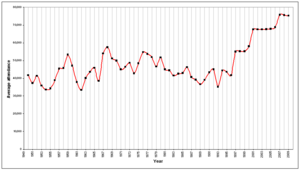
Manchester United is one of the most popular football clubs. They have many fans all over the world. The club has over 200 official fan clubs in at least 24 countries. They often go on summer tours to meet fans globally. Experts estimate Manchester United has 75 million fans worldwide. The club also has a huge following on social media.
Fans are represented by groups like the Independent Manchester United Supporters' Association (IMUSA). After the Glazer family bought the club in 2005, some fans started a new club. It is called F.C. United of Manchester. The West Stand at Old Trafford, called the "Stretford End," is where the most vocal fans sit. In March 2025, Manchester United launched its first Jewish supporters’ club. They also welcomed the "Stretford Sikhs" fan group.
Big Rivalries: Fierce Competitions
Manchester United has big rivalries with Liverpool and local neighbours Manchester City. They also have rivalries with Arsenal, Leeds United, and Chelsea.
Matches against Manchester City are called the Manchester derby. These are the two biggest teams in Manchester. It is one of the biggest local rivalries in British football. Especially since City became very strong in the 2010s. They have fought for league titles and FA Cup finals.
The rivalry with Liverpool comes from history. Manchester was known for textiles, and Liverpool was a major port. These two clubs are the most successful in English football. Together, they have won 40 league titles and many other trophies. Their matches are considered the most famous in English football. No player has moved directly between the clubs since 1964. Alex Ferguson once said his biggest challenge was to make United better than Liverpool. As of April 2025, Liverpool has 69 trophies, and United has 68. United leads in head-to-head matches with 83 wins to Liverpool's 72.
The "Roses Rivalry" with Leeds comes from old English history. It represents the historic rivalry between Lancashire (Manchester) and Yorkshire (Leeds).
The rivalry with Arsenal grew from their battles for the Premier League title. This was especially true under managers Alex Ferguson and Arsène Wenger. Their matches are often called "blockbusters."
Manchester United as a Global Brand
A Worldwide Name: More Than Just Football
Manchester United is known as a global brand. In 2011, experts valued the club's brand at £412 million. This was more than any other football club. In 2013, the club became the first sports team valued at $3 billion. In June 2017, Forbes magazine valued the club at $3.689 billion.
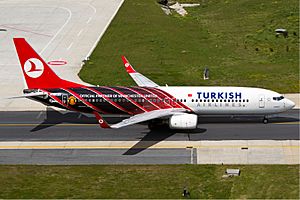
The club's global fame grew after the Munich air disaster. Manager Matt Busby rebuilt the team. This brought worldwide admiration. The team included stars like Bobby Charlton and George Best. Their attacking style of play was exciting. George Best became famous off the field too. He was known as the "Fifth Beatle" for his style.
The club became a public company in 1991. This helped them grow their business side. Manchester United focuses on both sports and business success. This brings in good profits. Famous players like David Beckham also helped the brand. His popularity in Asia was key to the club's success there.
Winning games helps the club earn more money. Higher league finishes mean a bigger share of TV money. Manchester United has always had high commercial income. They have many sponsors. For example, Nike managed the club's merchandise for years. The club also has its own TV channel, MUTV. This helps them reach fans everywhere.
Club Sponsors: Important Partnerships
| Period | Kit manufacturer | Shirt sponsor | ||
|---|---|---|---|---|
| chest | sleeve | back | ||
| 1945–1975 | Umbro | — | — | — |
| 1975–1980 | Admiral | |||
| 1980–1982 | Adidas | |||
| 1982–1992 | Sharp Electronics | |||
| 1992–2000 | Umbro | |||
| 2000–2002 | Vodafone | |||
| 2002–2006 | Nike | |||
| 2006–2010 | AIG | |||
| 2010–2014 | Aon | |||
| 2014–2015 | Chevrolet | |||
| 2015–2018 | Adidas | |||
| 2018–2021 | Kohler | |||
| 2021–2022 | TeamViewer | |||
| 2022–2024 | DXC Technology | |||
| 2024– | Snapdragon | Microsoft Copilot+ PC (League Cup) |
||
Sharp Electronics was the club's first shirt sponsor in 1982. This deal was worth £500,000. This partnership lasted until 2000. Then Vodafone signed a four-year, £30 million deal. Vodafone later ended their deal early.
In 2006, AIG signed a four-year, £56.5 million deal. This became the most valuable in the world. In 2010, Aon became the main sponsor. This deal was worth about £80 million. It was the most expensive shirt sponsorship in football history. In 2011, DHL became the first training kit sponsor. This deal was worth £40 million.
The club's first kit maker was Umbro. Then Admiral Sportswear took over in 1975. Adidas won the contract in 1980. Umbro returned in 1992 for ten years. Then Nike signed a record £302.9 million deal until 2015.
On July 30, 2012, United signed a seven-year deal with General Motors. Their brand Chevrolet became the shirt sponsor from 2014–15. This deal was worth $80 million a year. Nike did not renew their kit deal after 2015. Since 2015–16, Adidas has made Manchester United's kit. This is a 10-year deal worth at least £750 million. Kohler became the club's first sleeve sponsor in 2018–19. In 2021–22, TeamViewer became the main sponsor. At the end of the 2023–24 season, Snapdragon replaced TeamViewer. This deal is worth over £60 million a year. In August 2024, Qualcomm extended the deal until 2029.
Club Ownership and Finances
Who Owns Manchester United?
The club started with money from the Lancashire and Yorkshire Railway Company. In 1892, it became a company. Shares were sold to local fans. In 1902, four businessmen, including John Henry Davies, saved the club. They invested £500 each and took control. After Davies died in 1927, the club faced money problems again. James W. Gibson saved it in 1931. He invested £2,000 and took control.
Louis Edwards started buying shares in the club in the 1960s. By 1964, he owned 54% of the club. His son, Martin Edwards, became chairman in 1980. In 1989, Martin Edwards tried to sell the club. But the sale did not happen.
Manchester United was listed on the stock market in 1991. In 1998, Rupert Murdoch tried to buy the club. Fans formed a group called Shareholders United Against Murdoch. They tried to stop the takeover. The deal was blocked in 1999. Later, a disagreement happened between manager Alex Ferguson and major shareholders.
The Glazer Family and Sir Jim Ratcliffe
In May 2005, Malcolm Glazer bought a large part of the club. His company, Red Football Ltd, took control. The club was then taken off the stock exchange. As part of this purchase, the club took on some loans. This led to concerns from fans about the club's finances.
In January 2010, the club refinanced its loans. Fans showed their concern about the ownership. Some wore green and gold, the colours of Newton Heath. In August 2011, the Glazers planned to list shares on the Singapore stock exchange. But in July 2012, they listed shares on the New York Stock Exchange instead. This valued the club at $2.3 billion. The Glazer family kept most of the voting power.
By 2019, the club had paid over £1 billion in fees related to the Glazers' purchase. At the end of 2019, the club had nearly £400 million in net debt.
In 2023, the Glazers looked for buyers for the club. Sir Jim Ratcliffe, who owns Ineos, and a Qatari sheikh showed interest. On December 24, 2023, it was announced that Ratcliffe bought 25% of Manchester United. His company, Ineos Sport, took control of football operations. Ratcliffe's share grew to 28.94% by December 2024. The Glazers remain the majority owners.
Manchester United reported record revenues of £666.5 million in the year to June 2025. However, they still had a net loss of £33 million.
Current Players
First-Team Squad
|
|
Players Out on Loan
|
|
Under-21s and Academy Teams
Player of the Year Awards
| Team | First team | U21s | U18s | |
|---|---|---|---|---|
| Award | Sir Matt Busby Player of the Year | Players' Player of the Year | Denzil Haroun Reserve Team Player of the Year | Jimmy Murphy Young Player of the Year |
| Inaugurated | 1987–88 | 2005–06 | 1989–90 | 1989–90 |
| Holder (2024–25) |
||||
Coaching Staff and Managers
First-Team Coaching Staff

| Position | Staff |
|---|---|
| Head coach | |
| Assistant head coach | |
| First-team coaches | |
| Goalkeeping coach | |
| First-team and operations manager | |
| Head of sports medicine | |
| Senior first-team doctor | |
| Head physiotherapist | |
| First-team physiotherapists | |
| First-team lead soft tissue therapist | |
| First-team soft tissue therapists | |
| Head of physical performance | |
| First-team lead physical performance coach | |
| First-team strength and power coach | |
| First-team physical performance and reconditioning coaches | |
| Head of sports nutrition | |
| First-team nutritionist | |
| Senior kit manager | |
| Head of first-team performance analysis | |
| First-team performance analysts |
Managerial History
| Dates | Name | Notes |
|---|---|---|
| 1878–1892 | Unknown | |
| 1892–1900 | ||
| 1900–1903 | ||
| 1903–1912 | ||
| 1912–1914 | ||
| 1914–1921 | ||
| 1921–1926 | ||
| 1926–1927 | Player-manager | |
| 1927–1931 | ||
| 1931–1932 | ||
| 1932–1937 | ||
| 1937–1945 | ||
| 1945–1969 | ||
| 1958 | Caretaker manager | |
| 1969–1970 | ||
| 1970–1971 | ||
| 1971–1972 | ||
| 1972–1977 | ||
| 1977–1981 | ||
| 1981–1986 | ||
| 1986–2013 | ||
| 2013–2014 | ||
| 2014 | Caretaker player-manager | |
| 2014–2016 | ||
| 2016–2018 | ||
| 2018–2021 | ||
| 2021 | Caretaker manager | |
| 2021–2022 | Interim manager | |
| 2022–2024 | ||
| 2024 | Interim manager | |
| 2024–2026 | ||
| 2026 | Interim manager | |
| 2026–present | Interim manager |
Club Management
Ownership Structure
| Person / People | Associated company | Shares | Ref. |
|---|---|---|---|
| Glazer Family | Red Football Shareholder Limited | 71.06% | |
| Sir Jim Ratcliffe | Ineos | 28.94% |
Manchester United plc Board
| Position | Name |
|---|---|
| Executive co-chairmen | Avram Glazer Joel Glazer |
| Chief executive officer | Omar Berrada |
| Chief executive officer, new stadium development | Collette Roche |
| Chief financial officer | Roger Bell |
| Chief communications officer | Toby Craig |
| Chief business officer | Marc Armstrong |
| General counsel | Martin Mosley |
| Directors | Avram Glazer Joel Glazer Kevin Glazer Bryan Glazer Darcie Glazer Kassewitz Edward Glazer John Reece Rob Nevin |
| Independent directors | Robert Leitão John Hooks |
Manchester United Football Club Leadership
| Office | Name |
|---|---|
| Life president | Martin Edwards |
| Directors | Omar Berrada Dave Brailsford Michael Edelson Alex Ferguson David Gill |
| Head of international football relations | Jean-Claude Blanc |
| Director of football | Jason Wilcox |
| Director of recruitment | Christopher Vivell |
| Head of senior scouting | Kyle Macaulay |
| Head of academy scouting | Luke Fedorenko |
| Head of loans & pathways | vacant |
| Director of football negotiations | Matt Hargreaves |
| Director of football operations | Ameesh Manek |
| Director of performance | Sam Erith |
| Director of data | Mike Sansoni |
| People director | Kirstin Furber |
| Club secretary | Rebecca Britain |
Club Honours: Trophies Won
Manchester United is one of Europe's most successful clubs. They have won many trophies. Their first trophy was the Manchester Cup in 1886. In 1908, they won their first league title. They won the FA Cup for the first time the next year.
Since then, they have won a record 20 top-division titles. This includes a record 13 Premier League titles. Their 13 FA Cups are second only to Arsenal. The club has played in the FA Community Shield a record 30 times. They have won it a record 21 times.
Under Matt Busby, the club had great success. They won the FA Cup in 1948. In 1968, they became the first English club to win the European Cup. They also won five league titles and two FA Cups. The 1990s were the club's most successful decade. Under Alex Ferguson, they won five league titles and four FA Cups. They also won the UEFA Champions League and other European trophies.
The club has won the "Double" (league and FA Cup) three times. In 1995–96, they were the first club to do it twice. In 1999, United became the first English club to win the "Treble." This was the Premier League, FA Cup, and UEFA Champions League. They are one of only three British clubs to win the FIFA Club World Cup. In 2017, United won the UEFA Europa League. This made them one of five clubs to win all three main European club competitions.
The club's most recent trophy is the 2023–24 FA Cup.
| Type | Competition | Titles | Seasons |
|---|---|---|---|
| Domestic | First Division/Premier League | 20s | 1907–08, 1910–11, 1951–52, 1955–56, 1956–57, 1964–65, 1966–67, 1992–93, 1993–94, 1995–96, 1996–97, 1998–99, 1999–2000, 2000–01, 2002–03, 2006–07, 2007–08, 2008–09, 2010–11, 2012–13 |
| Second Division | 2 | 1935–36, 1974–75 | |
| FA Cup | 13 | 1908–09, 1947–48, 1962–63, 1976–77, 1982–83, 1984–85, 1989–90, 1993–94, 1995–96, 1998–99, 2003–04, 2015–16, 2023–24 | |
| Football League Cup/EFL Cup | 6 | 1991–92, 2005–06, 2008–09, 2009–10, 2016–17, 2022–23 | |
| FA Charity Shield/FA Community Shield | 21 | 1908, 1911, 1952, 1956, 1957, 1965*, 1967*, 1977*, 1983, 1990*, 1993, 1994, 1996, 1997, 2003, 2007, 2008, 2010, 2011, 2013, 2016 (* shared) | |
| Continental | European Cup/UEFA Champions League | 3 | 1967–68, 1998–99, 2007–08 |
| European Cup Winners' Cup | 1 | 1990–91 | |
| UEFA Europa League | 1 | 2016–17 | |
| UEFA Super Cup | 1 | 1991 | |
| Worldwide | FIFA Club World Cup | 1 | 2008 |
| Intercontinental Cup | 1 | 1999 |
- record
- s shared record
Winning Multiple Trophies in a Season
- Doubles
- League and FA Cup (3): 1993–94, 1995–96, 1998–99
- League and UEFA Champions League (2): 1998–99, 2007–08
- League and EFL Cup (1): 2008–09
- EFL Cup and UEFA Europa League (1): 2016–17
- Trebles
- League, FA Cup and UEFA Champions League (1): 1998–99
Short competitions like the FA Community Shield or FIFA Club World Cup are not usually counted towards a Double or Treble.
Manchester United Women's Team
The Manchester United Supporters Club Ladies team started in the late 1970s. It was the club's unofficial women's team. They helped start the North West Women's Regional Football League in 1989. In 2001, they officially partnered with Manchester United. But in 2005, the team was disbanded.
In 2018, Manchester United formed a new women's football team. They joined the second division of women's football in England. On May 12, 2024, the women's team won their first trophy. They lifted the 2023–24 Women's FA Cup. They beat Tottenham Hotspur 4–0 in the final.
See also
 In Spanish: Manchester United Football Club para niños
In Spanish: Manchester United Football Club para niños
- List of world champion football clubs
- List of football clubs in England
 | Madam C. J. Walker |
 | Janet Emerson Bashen |
 | Annie Turnbo Malone |
 | Maggie L. Walker |


